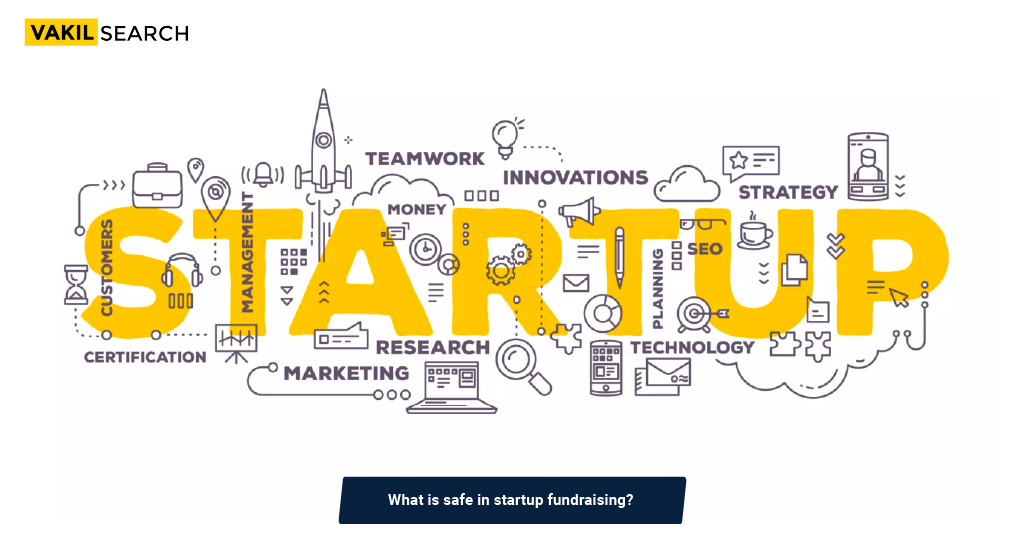Learn about SAFE, its benefits in startup fundraising, differences from traditional equity, and its role in the Indian startup scene with Vakilsearch's legal expertise.
Introduction
Startup fundraising is a critical aspect of turning innovative ideas into successful businesses. In recent years, various methods and instruments have emerged to facilitate fundraising for startups. One such instrument gaining popularity is the SAFE, or Simple Agreement for Future Equity. In this article, we will introduce the concept of SAFE and its role in startup fundraising. We will explore its advantages, how it differs from traditional equity, and its relevance in the Indian startup ecosystem.
What is SAFE?
SAFE, which stands for Simple Agreement for Future Equity, is a financial instrument designed to facilitate early-stage fundraising for startups. It was created by Y Combinator, a renowned startup accelerator, to streamline the fundraising process and make it more founder-friendly. SAFE agreements are typically used in seed-stage or pre-seed investments.
How Does SAFE Work?
A SAFE agreement allows investors to provide capital to a startup in exchange for the promise of future equity when a predetermined triggering event occurs. This event is usually the startup’s next funding round, known as the ‘qualified financing’ or ‘conversion event.’ When the conversion event takes place, the SAFE converts into equity at a pre-agreed valuation, and investors receive their equity shares.
Advantages of SAFE for Startup Fundraising
-
Founder-Friendly
One of the most significant advantages of SAFE for startups is that it is founder-friendly. Unlike traditional equity financing, SAFE does not require immediate valuation of the company or the issuance of equity shares. This means that founders can delay equity dilution until a later stage when the company’s value is clearer.
-
Simplicity and Speed
SAFE agreements are relatively simple and straightforward, reducing legal complexities and negotiation time. This simplicity makes it an attractive option for both startups and investors, as it can expedite the fundraising process.
-
Flexibility
SAFE allows startups to raise capital without having to set an immediate valuation for their company. This flexibility is particularly beneficial in the early stages when determining a fair valuation can be challenging.
-
Conversion Mechanics
When the conversion event occurs, SAFEs convert into equity at a predetermined valuation cap or discount rate, benefiting early investors. This feature incentivises early-stage investors to support startups in their early growth phases.
How SAFE Differs from Traditional Equity?
-
No Immediate Equity Issuance
Unlike traditional equity financing, where investors receive equity shares immediately, SAFE postpones the issuance of equity until a later date or triggering event. This delay allows startups to raise capital without determining an immediate valuation.
-
Valuation at Conversion
The valuation of the startup for equity conversion is typically determined at the conversion event, rather than during the SAFE agreement’s execution. This approach mitigates the risk of overvaluing or undervaluing the company during its early stages.
-
Simplicity
SAFE agreements are designed to simplify the fundraising process. They are shorter and more straightforward than traditional equity contracts, reducing legal fees and negotiation time.
-
Investor Protections
While SAFE agreements are founder-friendly, they may include investor protections, such as conversion discounts and valuation caps, to ensure that early investors are appropriately rewarded for their risk.
SAFE in the Indian Startup Ecosystem
-
Emerging Popularity
SAFE agreements are gaining popularity in the Indian startup ecosystem, primarily due to their simplicity and founder-friendly nature. Many early-stage startups are exploring SAFE as an alternative to traditional equity financing.
-
Regulatory Considerations
Indian startups should be aware of regulatory considerations when using SAFEs. The Securities and Exchange Board of India (SEBI) has recognised the need for regulatory clarity in this area and has been working on guidelines for convertible securities, which could include SAFEs.
-
Alignment with Early-Stage Needs
SAFE agreements are particularly relevant for Indian startups in their early stages when valuing a company can be challenging. They provide a flexible and founder-friendly way to raise capital without the complexities associated with equity issuance.
-
Building Investor Confidence
As SAFEs become more common in the Indian startup ecosystem, they can help build investor confidence by providing a standardised and transparent framework for early-stage investments.
Case Study: Razorpay’s SAFE Agreement
Razorpay, a leading Indian fintech startup, used a SAFE agreement in its early-stage fundraising. The company raised $20 million through this instrument from marquee investors, including Y Combinator. This SAFE allowed Razorpay to access capital without the need for an immediate valuation, giving the company the flexibility to focus on growth.
Conclusion
SAFE, or Simple Agreement for Future Equity, is a modern and founder-friendly financial instrument that is changing the landscape of startup fundraising. Its advantages in terms of flexibility, simplicity, and alignment with early-stage needs make it a valuable option for startups in the Indian ecosystem.
While SAFEs offer many benefits, startups should be aware of regulatory considerations and seek legal guidance to ensure compliance with Indian laws. This is where Vakilsearch plays a crucial role. Vakilsearch’s expertise in legal matters, including compliance and regulatory issues, can provide startups with the guidance and support they need to navigate the complexities of SAFE agreements and ensure they adhere to Indian laws and regulations.
As the Indian startup ecosystem continues to evolve, SAFE agreements are likely to play a prominent role in facilitating early-stage investments and supporting the growth of innovative businesses. As entrepreneurs and investors embrace this innovative instrument, it contributes to the vibrancy and dynamism of the Indian startup landscape. With Vakilsearch as a trusted partner, startups can navigate the legal aspects of fundraising with confidence and focus on building the future.




